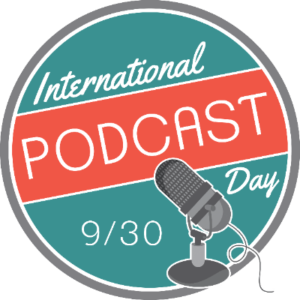 September 30th marks International Podcast Day.
In honor of this day designed to increase awareness about podcasts and podcasting, I offer this overview about how a historian might start a podcast while in graduate school.
September 30th marks International Podcast Day.
In honor of this day designed to increase awareness about podcasts and podcasting, I offer this overview about how a historian might start a podcast while in graduate school.
The Behind-the-Scenes Work
Podcasting is a lot of work.
Each episode of Ben Franklin's World represents somewhere between 40 and 60 hours of work. That work includes researching a guest, scheduling an interview, preparing for the interview, conducting the interview, editing the episode, drafting and recording intros and outros, drafting and posting show notes, creating custom graphics, and promoting the episode on its release day.
This does not count the time my audio engineer spends working on each episode nor the time I spend working on the website, troubleshooting tech hiccups, interacting with listeners, creating supplements for some episodes, or developing presentations about the podcast and podcasting for different conferences and talks.
None of the above is meant as a complaint. I love what I do.
Instead, the above overview is meant to underscore the fact that podcasting is a TON of work. Truthfully, I can't imagine trying to podcast and do it well while in graduate school.
With that said, some of you want to attempt to podcast while in grad school. So I've stretched my imagination to craft this primer to give you ideas about how you might produce a quality podcast and write a dissertation.
First, a note of caution.
Many graduate students wish to podcast because they believe it will set them apart on the job market. I do believe it could set you apart. I also believe producing a podcast could hurt your chances on the job market.
If you take too long to finish your dissertation, you will run into funding problems and some hiring committees might look unfavorably upon the extra time you took to finish your degree. Hiring committee members might also take the time to listen to your podcast. A low-quality podcast could reflect poorly upon you even if you have high-quality written work.
Time to degree and the quality of your digital scholarship matters.
6 Steps to Creating a Podcast While in Graduate School
Step 1: Careful Consideration
Before you produce a podcast you need to consider 4 components:
1. Topic
What period or aspect of history will your podcast explore and investigate?
It's important to pick a period and aspect of history that you could talk about all day. The more narrow you can go in your topical focus, the better because topic specificity will enable you to find members of your target audience faster.
The most successful podcasts tend to have very narrow focuses or "niches" (the industry term for topic).
Ben Franklin's World is odd in that it has a broad "niche" and it's successful. Two years ago, I could get away with framing my podcast around what is known as "vast early America" because there was only one other podcast about early American history and it had a different format and a more haphazard release schedule than BFWorld.
If I started a podcast today, I would have to think more narrowly. I might podcast on the American Revolution or perhaps on the American Revolution in the northeast. The latter may sound like a very narrow topic, but local history is so hot right now and that topic would work.
2. Audience
Who is your ideal listener or podcast avatar?
My podcast avatar is the fictional Janet Watkins. She's a 22-year-old pre-med student at SUNY-Buffalo and she's a woman of color. Janet hates history because her teachers have always linked history to dead, white men and have never related how history informs her present day.
My goal with each episode is to make Janet care about the early American past.
3. Format
What kind of podcast will you produce?
Will you conduct interviews? Will you produce short, solo episodes? Will you present scripted, narrative stories?
You need to consider how you will discuss and present the topic you have chosen for your podcast before you start podcasting. Research indicates that listeners like regularity. They want to be able to depend on a consistent release schedule and a mostly consistent format. This doesn't mean you can't offer both interviews and solo episodes, but you should pick one format to predominate.
4. Release Schedule
Consistency and frequency matter.
The best performing podcasts release on a consistent basis.
Time is our most precious resource and listeners invest time into listening to our podcasts. Podcast listeners tend to be loyal to their favorite shows and they want their favorite shows to be loyal to them. Being loyal to your listeners means not just producing high-quality content, it means producing it on a regular schedule listeners can depend on.
If I were in graduate school, I would create a series-based podcast. I would casually research and plot episodes during the school year, produce episodes during the less hectic summer period, and release episodes over a set number of weeks during the school year. As my episodes aired, I would start the casual research and plotting process over so I could release new episodes again the following fall.
I strongly recommend you refrain from attempting to produce a weekly or bi-weekly show while you are in graduate school. The production pace of a weekly or bi-weekly show is grueling and unrelenting.
Step 2: Create a Budget
Podcasts are free to consume, they are not free to produce.
At minimum you will need to invest in a good hosting service for your audio files. I recommend Libsyn.
Before you start podcasting decide how much money you are willing to spend to both get your podcast up and running and on monthly expenses such as audio hosting, website hosting, and editing services.
The more you get into podcasting the more money you will want to spend to upgrade your equipment and invest in new apps and software. Know how much you can and are willing to spend at the start.
Step 3: Invest in a Good Mic
Audio quality matters.
If you want people to listen to your ideas and what you are saying, you need to invest in a good mic that will allow you to present your ideas clearly.
Many podcasters use the Audio-Technica ATR2100, USB microphone. It's about $80 from Amazon and it occasionally goes on sale for around $50. This is a high-quality, versatile mic.
I record on a Heil-PR40. I purchased a kit wholesale from Broadcast Supply Warehouse for about $400. To that kit I added a Scarlet 2i2 USB mixer ($149) so I could connect my mic to my computer.
The Heil-PR40 is a fire-end microphone, which means if you set your gain right, it will catch only the noise directed into the end of the mic.
Not everyone will sound good on the same microphone. My friend Natalie Eckdahl (BizChix Podcast) records using a Heil-PR30 because she found the PR-40 deepened her voice.
The best course of action when buying a microphone is to go to a Guitar Center or a local music shop that sells mics and try them out. Then you can hear which mics make you sound great.
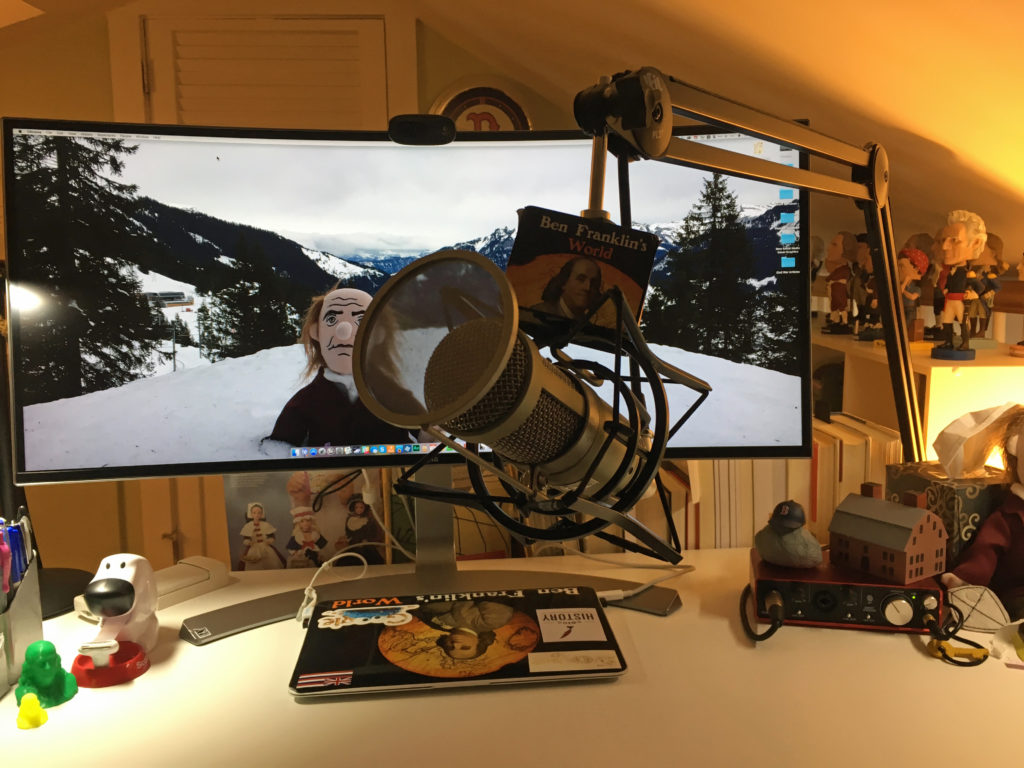
Step 4: Learn How to Use Editing Software
The quality of your content matters.
If you want listeners to take time to listen to you, you need to invest time in producing something worth listening to. You need to invest time into editing your show.
Ben Franklin's World is on the highly-produced end of the podcast spectrum. I remove "ahs," "ums," breath sounds, and extraneous speech from recordings. I also repair (when possible) drops and blips in waveforms and I make content edits.
When I listen to raw recordings, I listen not just for everything I mentioned above, I also listen to the flow and pace of the conversation. I take out extraneous rambling, tangential information that adds nothing to the points my guests are trying to make, and I sometimes re-order questions and answers to improve the flow of the conversation.
After I'm done, I send the edited files to Darrell Darnell, my assistant editor and audio engineer, so he can edit the file again and use his software to make each episode sound as good as possible.
Editing is a lot like writing. It's hard work, but fairly easy to do if you have the right tools. I started editing with a single-track editor called Fission. Today, I use a multi-track editor called Adobe Audition.
Many podcasters use Audacity, which is free. Some use Garageband. NPR uses ProTools.
Regardless of what audio software you use, take the time to learn to use it.

Step 5: Launch Your Podcast
Your job as a podcaster does not end after your edit. You must upload and promote your content.
Once you finish working on your audio file, you should tag your file with metadata. I use the ID3 Editor app. Libsyn recently added a feature to their hosting service where it will add metadata to your file after you write the description for your file.
You should list your feed with at least iTunes (the number one podcast directory), Google Play Music, and Stitcher Radio. These podcast providers are also podcast directories and they make it possible for listeners to find your show.
Once the directories list your show, promote. Promote your content on social media networks, on other podcasts, and wherever, whenever you can.
Step 6: Manage Your Expectations
Growing an audience takes time and few podcasters are ever satisfied with the size of their audience.
I've been public about the success of Ben Franklin's World, yet BFWorld and its monthly average of 68,000 downloads is an exception, not the rule.
Libsyn is the largest podcast hosting service. Each month they publish statistics for the average number of downloads a new episode receives over the course of a month (the lifespan of a new episode) and the average number of total downloads entire shows receive over the course of a month (this number includes new episodes and back catalogs).
In July 2016, an average new podcast episode received 164 downloads; the average podcast received 2,039.9 downloads.
In Summary
Podcasting is a lot of work. To do it well requires a lot of time, some money, and attention to detail. If you have the time, money, and drive it can be a very powerful way to create awareness about history.
If you are interested in learning how to podcast, tell your department head and graduate advisor. Podcasts make great tools for teaching and they could require less individual time if a department started one as a group effort. If your professors have questions about how they might start a departmental podcast, have them send me an e-mail. I have lots of ideas and a working podcast I would love to use as a teaching tool.
 I often wish I had some sort of time creation device. I'd take Hermione's time turner if it were available. However until such a device exists, I must create time the old fashioned way: by finding and making it within my schedule.
I need time for my new research project on the Articles of Confederation. I started this new project during a two-day research trip I tied in with a speaking engagement in late October. Since then progress on the project has been slow, but I'm making progress.
I often wish I had some sort of time creation device. I'd take Hermione's time turner if it were available. However until such a device exists, I must create time the old fashioned way: by finding and making it within my schedule.
I need time for my new research project on the Articles of Confederation. I started this new project during a two-day research trip I tied in with a speaking engagement in late October. Since then progress on the project has been slow, but I'm making progress.
 September 30th marks
September 30th marks

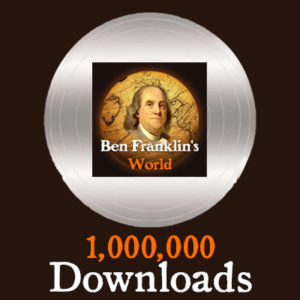 Ben Franklin's World hit a big milestone this past weekend. On Saturday, September 17, 2016, it reached and surpassed 1 million downloads.
Or as I like to joke,
Ben Franklin's World hit a big milestone this past weekend. On Saturday, September 17, 2016, it reached and surpassed 1 million downloads.
Or as I like to joke, 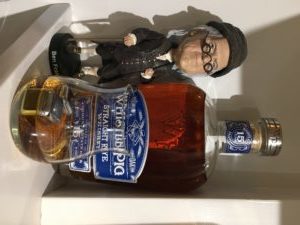 When episode 100 airs tomorrow (Sept 20), I will enter a different level in the podcasting space; the level that says I'm statistically likely to continue podcasting for another 1-3 years for a total of 3-5 years. It will be interesting to see if this holds true or if Ben Franklin's World and I become a statistical outlier. Time will tell.
When episode 100 airs tomorrow (Sept 20), I will enter a different level in the podcasting space; the level that says I'm statistically likely to continue podcasting for another 1-3 years for a total of 3-5 years. It will be interesting to see if this holds true or if Ben Franklin's World and I become a statistical outlier. Time will tell.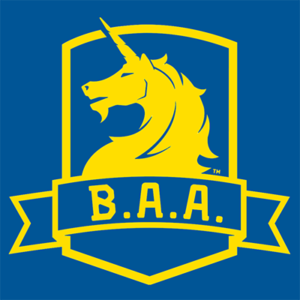 On Sunday, October 9, 2016, I'm running my first half marathon.
Why?
On Sunday, October 9, 2016, I'm running my first half marathon.
Why?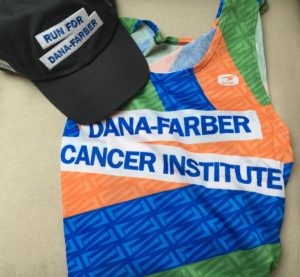 The desire to run this particular half marathon has to do with the fact that it's a fundraiser for the
The desire to run this particular half marathon has to do with the fact that it's a fundraiser for the 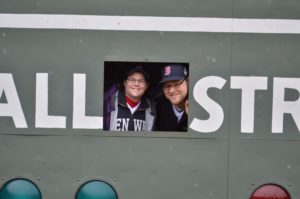 Needless to say, all of this was a lot to take in, especially as we weren't talking about abstract scenarios.
Needless to say, all of this was a lot to take in, especially as we weren't talking about abstract scenarios.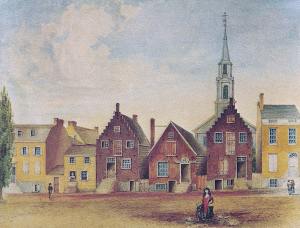 This means my dissertation never had a literature review. Most of the references I made to other scholars occur in my notes, not the main text. And while not perfectly written, my dissertation conveys its ideas with clear writing and active verbs.
This means my dissertation never had a literature review. Most of the references I made to other scholars occur in my notes, not the main text. And while not perfectly written, my dissertation conveys its ideas with clear writing and active verbs.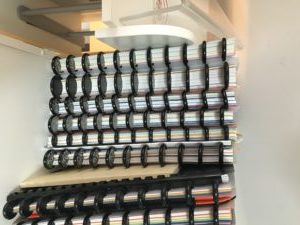 One year ago this week, I shelved my book manuscript. I didn't want to put it aside; I was making great progress. However, good issues and problems due to the quick growth of
One year ago this week, I shelved my book manuscript. I didn't want to put it aside; I was making great progress. However, good issues and problems due to the quick growth of 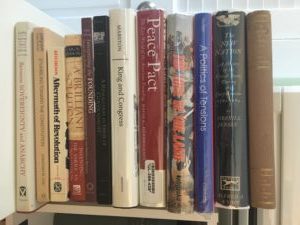 I'm starting work on my next long-term research project: The Articles of Confederation. Over the last year and a half, I've been mining footnotes and steadily accumulating books about the subject. No one has undertaken a serious study of the Articles since Merrill Jensen in 1950.
I'm starting work on my next long-term research project: The Articles of Confederation. Over the last year and a half, I've been mining footnotes and steadily accumulating books about the subject. No one has undertaken a serious study of the Articles since Merrill Jensen in 1950.